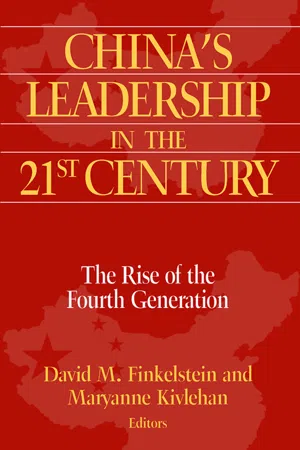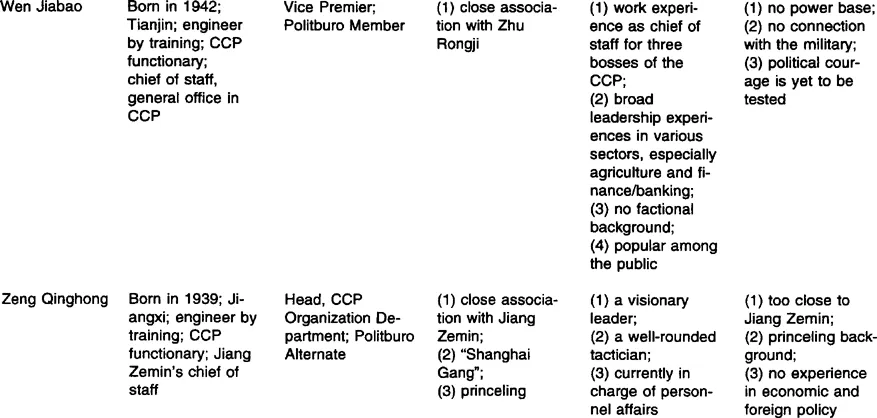![]()
II
China’s New Leaders
![]()
2
Rising Stars and the Transition to the Fourth Generation
Cheng Li
Each generation has distinctive characteristics fostered by the sociopolitical environment during formative years. Consequently, generational cohorts often share collective behavioral attributes.1 In the People’s Republic of China (PRC), the concept of generations—or, more precisely, political elite generations—has also been based on the distinctive historical experiences of elites.2 The first three elite generations in the PRC are identified as the “Long March generation,” the “Anti-Japanese War generation,” and the “Socialist Transformation generation,” represented by Mao Zedong, Deng Xiaoping, and Jiang Zemin, respectively.
The upcoming Sixteenth Congress of the Chinese Communist Party (CCP) and the Tenth National People’s Congress (NPC) will mark the shift to the so-called Fourth Generation of leaders. Now in their 50s to early 60s, the Fourth Generation leaders all had their formative experiences during the Cultural Revolution. They were either in school (elementary school, middle school, or college) or had just begun work when the Cultural Revolution took place in 1966. This “unparalleled revolution in the history of mankind” (borrowing Mao’s words) had an everlasting impact on them because their loyalty was betrayed, their dreams were shattered, their education was lost, and their careers were interrupted. Some Fourth Generation leaders have attributed their political advancement today specifically to the lessons learned, the hardships endured, and the wisdom derived during the Cultural Revolution.3
It is critically important to study both the generational attributes and idiosyncratic characteristics of new leaders. The upcoming succession, however, is not just a changing of the guard. Its ramifications go beyond that of generational change. This political succession constitutes a severe test of whether China can take a major step toward a peaceful and more institutionalized power transition. To a certain extent, the power transition from Deng Xiaoping to Jiang Zemin was peaceful. The difference between the preceding succession and this upcoming one is that, for many years, Jiang’s legitimacy was based on the support of Deng and other elders; but top contenders of the new generation can stand on their own, even now. This is precisely the reason why China-watchers are paying so much attention to this power transition and to the characteristics of the Fourth Generation leaders.
An analysis of the career patterns and political behaviors of Fourth Generation leaders reveals a paradox. Nepotism in various forms (e.g., school ties, blood ties, regional affiliations, or patron-client ties) has played a very important role in the selection of new leaders. But, at the same time, some institutional mechanisms (e.g., age limits for retirement, term limits, intra-Party elections, and regional representation) have been adopted as part of the Chinese political system in order to curtail favoritism. The front-runners of the Fourth Generation—Hu Jintao, Wen Jiabao, Zeng Qinghong, and Li Changchun—have all expedited their political careers through guanxi (connections), yet they are now far more interested in seeking legitimacy through institutional channels than their predecessors were. The unfolding of these paradoxical developments will not only determine who will rule China for most of this decade and beyond, but, even more important, how this most populous country in the world will be governed.
Hu’s on First? Four Top Contenders to Watch
It has been widely believed that current Vice President Hu Jintao, Vice Premier Wen Jiabao, Head of the CCP Organization Department Zeng Qinghong, and Guangdong Party Secretary Li Changchun are four front-runners in the new generation of leadership (see Table 2.1). They are in their late 50s or early 60s. All of them were trained as engineers in China’s elite engineering schools, but had political careers as Party functionaries or industrial managers. They all joined the Party during their college years, but acquired their first major political experience during the Cultural Revolution. None of them was a radical activist during the Cultural Revolution, yet their political and professional careers were all interrupted.4 Hu and Wen were sent to Gansu, a poor inland province, where both worked for over a decade. Zeng was also sent first to a military base in Guangdong, and then to a collective farm in Hunan where he worked as a manual laborer. Li was not sent to a distant place; instead he worked for many years as an electric welder in Shenyang. Enormous physical hardship and an ever-changing political environment nurtured within all of them some valuable traits such as adaptability, endurance, and grass-roots consciousness.
Table 2.1
Four Top Contenders in the Fourth Generation Leadership
Hu Jintao: A Recognized Successor
Among these four contenders, Hu Jintao is undoubtedly the first poised to take the helm. If he survives the next year without a major blunder, he will replace Jiang as Party chief and president of the state. All signs thus far suggest that this is the most likely scenario. Since his appointment as vice president of the PRC in 1998, Hu has widely been recognized as the successor to Jiang. This became even clearer when Hu was also appointed as vice chair of the Central Military Commission (CMC) in 1999. These two appointments made it clear that there is an unambiguous pecking order in the political succession. Hu Jintao was not a protégé of Jiang. He was promoted by Deng and was later appointed by Jiang. This places Hu in a very advantageous position; he has Jiang’s endorsement, but his rise to the top leadership will not be seen as a result of nepotism.
What makes Hu a favorite in the upcoming succession is not only the current positions that he holds but also the broad political associations that he has established throughout his career. Hu is a prominent member of the so-called Qinghua University Clique; he headed the Chinese Communist Youth League (CCYL) in the early 1980s; and he has served as president of the Central Party School since 1993.5 All three of these institutions have now become the main sources of elite recruitment.
In addition, Hu has been known for his low-profile personality. This is the main reason that foreign observers have often characterized Hu as a “mystery,” although he recently had his widely publicized “coming-out-party” by traveling to Western Europe, Russia, and the United States. Hu has to be politically cautious because he knows too well that in the history of the PRC many appointed heirs (e.g., Liu Shaoqi, Lin Biao, and Wang Hongwen under Mao; Hu Yaobang and Zhao Ziyang under Deng) fell suddenly from favor. It would be unwise for Hu to be too much in the spotlight or to express his opinions too openly while his boss, Jiang Zemin, is still in charge.
Another advantage that Hu has is his leadership experience in youth affairs and his nationalistic appeal to young people in the country. He recently stated that the future of the CCP would largely depend on whether the new leadership could win over public support, especially among the country’s younger generations.6 Hu’s widely publicized television speech in response to the Chinese Embassy bombing in Belgrade was another example that showed his nationalistic appeal during a time of crisis. Chinese nationalism is on the rise. In sharp contrast to the Tiananmen movement in 1989, a large number of public intellectuals and college students are calling for a strong state and a powerful national leadership. Chinese national consciousness (minzhu yishi) has ree-merged and become an effective glue.
Because he has an image of being both open-minded and effective in expressing patriotic sentiment, Hu is acceptable to both the liberal and conservative wings of the CCP. Furthermore, Hu will likely benefit from the “age effect.” A relatively young leader such as Hu Jintao can sometimes convey a sense of competence and confidence that can lead to popularity among the general population.
While all these factors suggest that Hu’s chance of succeeding Jiang is secure, he has three main shortcomings: (1) he has little connection with the military, (2) he achieved very little as a provincial chief either in Guizhou or in Tibet, and has also accomplished little at the national level, and (3) he has yet to demonstrate his competence in economic and foreign affairs.
Wen Jiabao: A Leading Candidate for Premier
Wen Jiabao is the most likely candidate to replace Zhu Rongji as premier in 2003. Wen is one of the most popular political leaders in the country; he is often seen as a Zhou Enlai-like figure. Wen’s experience is remarkable; he worked as a chief of staff for three bosses (Hu Yaobang, Zhao Ziyang, and Jiang Zemin), two of whom were purged while he survived. Wen has gained broad administrative experience over the past decade—handling political crises such as the 1989 Tiananmen incident, coordinating power transitions, and commanding the anti-flood campaign in 1998 (w...



